-

Challenge
Wall Colmonoy每年為汽車、采礦、食品行業等各行各業客戶鑄造生產數千個零件,不僅須制造和維護大量工具、夾具和固定裝置,而且還須創新設計或修改時快速制造新的輔助工具或改造現有的工具。同時保持低成本和縮短交貨時間。 -

Solution
The story of Wall Colmonoy begins with a pair of metallurgists, Norman Cole and Walter Edmonds, who developed an -

Results
Wall Colmonoy工程師現在可將多個零件一批次打印出來,高效且零件質量出色。該系統還可輕松打印出特殊造型零件-如復雜的曲面、底切和無支撐懸壁結構。這是費時且昂貴的傳統制造方式不可比擬的。增材制造賦予Wall Colmonoy相比傳統方法更快地迭代設計能力。
The story of Wall Colmonoy begins with a pair of metallurgists, Norman Cole and Walter Edmonds, who developed an alloy called Colmonoy. Recognizing the importance of this breakthrough, entrepreneur A.F Wall purchased the Colmonoy patent and founded the company in 1938, commercializing its early products. Colmonoy, the first nickel-based case-hardening alloy, is widely used in the petroleum industry to extend the life of downhole tools and drill bits. Further innovation came in the 1950s with the invention of the new high temperature nickel brazing technology, Nicrobraz. The company became a pioneer in NiMH brazing of aircraft turbine engine components. Today, Wall Colmonoy is a global leader in materials engineering, with products including brazed and case hardened products for aerospace, automotive, glass container, oil and gas, mining, and other industries, as well as precision castings, coatings and engineered components.
This is largely self-evident, but when it comes to manufacturing, each industry has its own unique challenges. Parts used in oil and gas extraction will face very different demands in terms of strength, corrosion resistance and hardness than those used in less demanding environments such as consumer products, and meeting these demands means overcoming different manufacturing hurdles. For all these differences, however, there are some common goals—such as keeping costs low, shortening lead times, and minimizing downtime—that remain the same for almost all manufacturers. Wall Colmonoy casts thousands of parts each year for customers in the automotive, mining, food industries, and more. Not only does it have to manufacture and maintain a large number of tools, jigs and fixtures, but it also has to quickly manufacture new auxiliary tools or tools when innovative designs or modifications are made. Retrofit existing tools. To meet these challenges while keeping costs low and lead times fast, the company turned to the Desktop Metal Shop System™ for metal binder jetting technology.
 The Shop System Matel 3D Printing Solution
The Shop System Matel 3D Printing Solution
Using the Shop System, Wall Colmonoy can produce its own tools by 3D printing its own metal parts. Wall Colmonoy significantly reduces manufacturing downtime associated with production tooling and enables rapid improvements to existing tooling designs. In addition to printing tools, the system works by directly printing parts as new designs emerge or customer needs change. This speed and flexibility also opens up new design freedoms for Wall Colmonoy customers. As the technology enables large design spaces, Shop System™'s additive manufacturing technology opens the door to integrated batch manufacturing, and Wall Colmonoy engineers can now print multiple parts in one batch with high efficiency and excellent part quality. The system also easily prints specially shaped parts - such as complex curved surfaces, undercuts and unsupported overhangs. This is incomparable with the time-consuming and expensive traditional manufacturing methods. Additive manufacturing gives Wall Colmonoy the ability to iterate designs faster than traditional methods.
This latest purchase marks a new chapter for Wall Colmonoy and our inspiration for the possibilities of metal 3D printing to truly expand our capabilities.
— Chris Weirman technical director, Wall Colmonoy
 Why We Choose Desktop Metal?
Why We Choose Desktop Metal?
Before investing in the Desktop Metal Shop System™, Wall Colmonoy engineers explored the use of laser-based metal printers and found many limitations. In addition to the extensive post-processing required to remove the build plate and print supports, laser-based systems are relatively slow, resulting in low throughput and relatively high cost per part. In contrast, the Shop System enables the company to achieve higher throughput—a key consideration for Wall Colmonoy. Another key consideration is that the system is built around well-understood and proven processes used in traditional powder metallurgy, especially those used for metal injection molding (MIM). With long experience in powder metallurgy, especially the sintering process, Wall Colmonoy engineers are confident in how the system works and its ability to produce high-quality 3D printed metal parts.
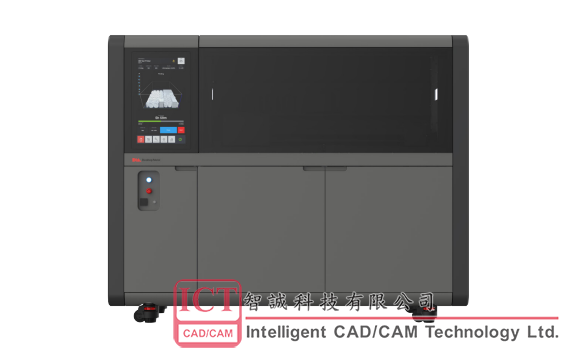
Part Fabrication & Comparison
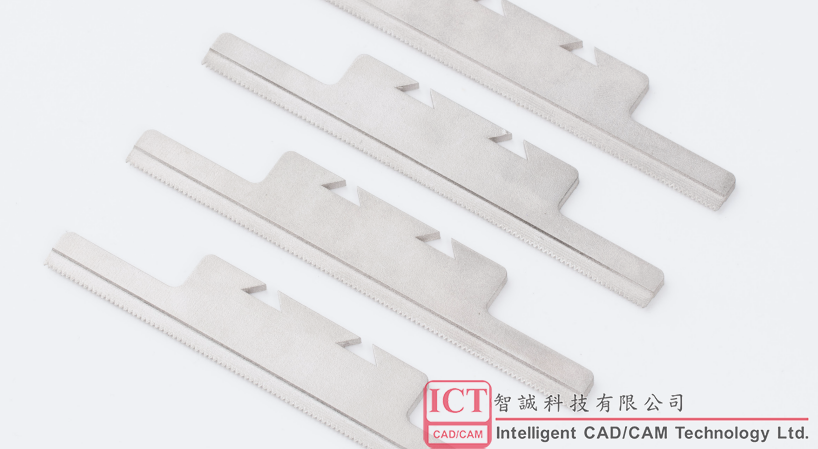 Sterile Knife
Sterile Knife
A key component used on many food processing lines, knives like these are used to cut laminated cardboard for aseptic packaging of everything from milk and soup to salad dressings. Using traditional methods such as investment casting and machining, the blade and holder are manufactured as separate parts—a process that requires up to 40 separate steps—and then assembled into a single component. Using the Desktop Metal Shop SystemTM, Wall Colmonoy was able to 3D print the blade as a single piece with adhesive jetted. This reduces the number of manufacturing steps to less than 10, significantly reducing lead times and cutting part costs in half. While the various sizes and geometries of these knives challenge traditional manufacturing, 3D printing allows Wall Colmonoy to easily keep up with changing customer demands. Companies can print up to 200 in a single blade, 8-liter workshop system build, without the logistical challenges of storing and tracking a large inventory of tools. One-piece manufacturing also allows for significantly improved recyclability of these components. In traditional manufacturing, these tools are often assembled from multiple parts, which may be made of different alloys. In order to recycle these parts, each alloy must be separated before recycling. One-piece designs enabled by additive manufacturing eliminate these extra steps. This part was printed in 17-4 PH stainless steel and was created by Wall Colmonoy to test the performance of the 3D printed tool. For production, the company is exploring printing parts from its food-safe Wallex® 6K alloy.
Part Fabrication & Comparison
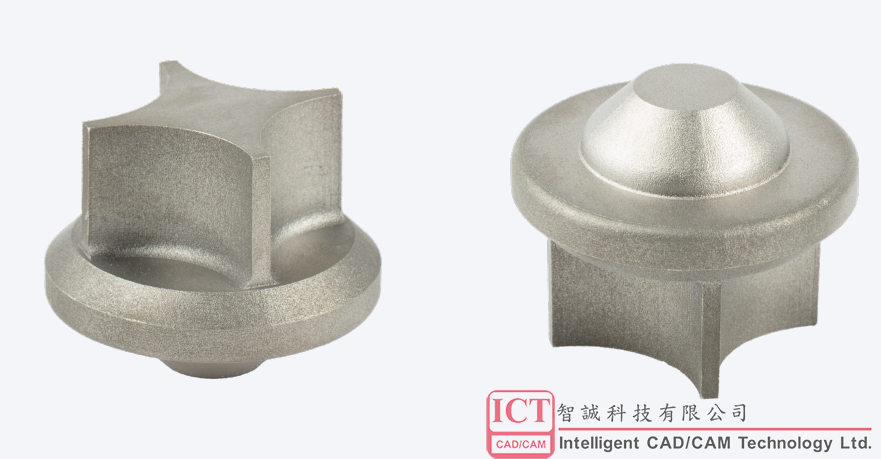
Pump Assembly
Pump system components are usually made by investment casting, but the relatively low throughput (only around 100 per week) makes them ideal for printing with the Shop System. With the Shop system, Wall Colmonoy was able to produce hundreds of these parts with a lead time of just one week. Traditional methods take three to six weeks with existing tools, and up to 10 weeks if tools need to be created. This speed of delivery, a week instead of more than two months, is a huge advantage for Wall Colmonoy, allowing the company to process customer orders faster than competitors that rely on traditional methods.
Part Fabrication & Comparison
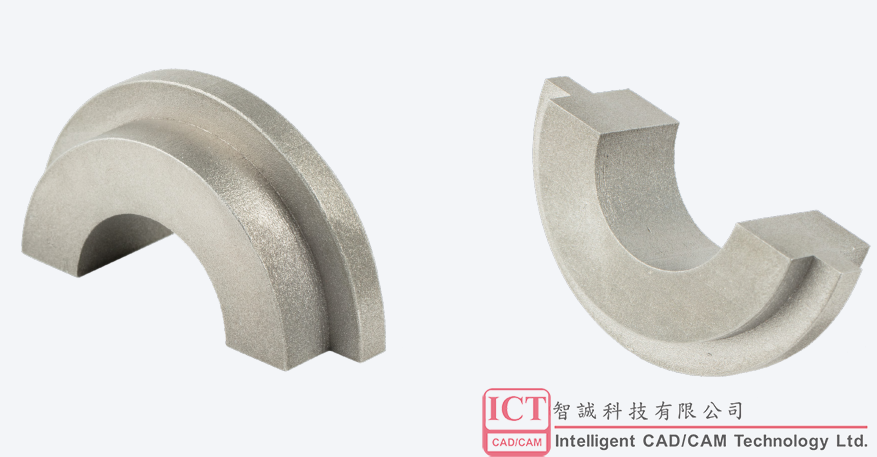
頸環Neck Ring
It is used to hold the mold during the blow molding process for the production of glass bottles. Glass neck rings are typically made by investment casting, which presents many challenges to traditional manufacturing. While parts are typically produced in large quantities, their designs vary widely, with different diameters, widths, and threads, forcing manufacturers to produce specific molds for each variation. Using the Shop System, Wall Colmonoy can not only provide estimates within hours, but can have finished parts in the hands of customers in just a few days.
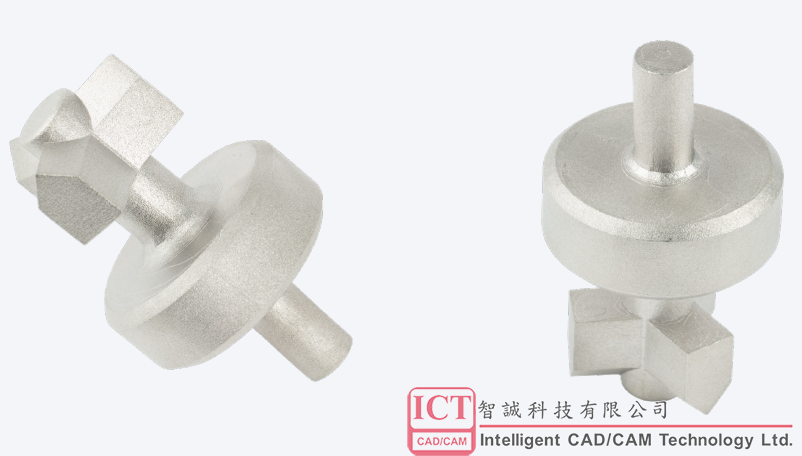
Homogenizing valve
Homogenizing valves like these are widely used in the food industry to help distribute a substance, such as fat globules in milk, evenly throughout a liquid. Typically casting, this part is a slow and expensive process because it requires complex multi-component tooling to create the complex shape of the valve, which has undercuts and unsupported arms. Depending on the application, these valves can come in a variety of sizes and geometries, leading to the logistical challenges of maintaining and tracking large inventory of tools. By eliminating the need for tooling, the Shop System enables Wall Colmonoy to produce such valves at significantly reduced cost and lead time. 3D printing also allows the creation of new designs that optimize valve performance by incorporating features that are difficult to justify with traditional manufacturing without increasing the cost of printing.
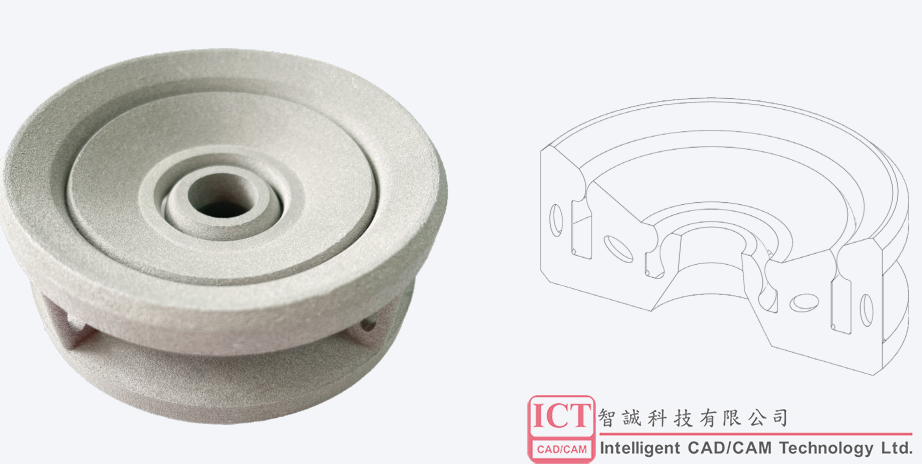
Atomizing Nozzle
In addition to printing parts for a variety of clients, Wall Colmonoy used the Shop System to develop this innovative atomization insert for the production of metal powders. During atomization, molten metal is passed through a nozzle, releasing the molten stream into a nitrogen jet that converts the metal into fine droplets, which cool to form a fine powder. Using different inserts to affect gas velocity, manufacturers can control powder properties such as particle size and uniformity. Using the workshop system, Wall Colmonoy engineers are experimenting with new blade designs to produce finer powders. By printing its own atomized parts on site, Wall Colmonoy has accelerated productivity gains that would not have been possible without 3D printing. Rapid printing of parts means new iterations can be printed and tested quickly, generating data to drive fast-paced learning. This developed atomization insert is not only designed to reduce the likelihood of satellite particles in noble gas atomization, but also to create conditions for supersonic noble gas velocities from subsonic supplies. The end result of the new design is not only greater atomization force and the production of a finer powder product with less gas consumption, but also increased powder yield - especially for fine AM grade powders and due to improved morphology the Hausner ratio.
Evaluation
The DDM Shop system was a major success in Wall Colmonoy's first foray into additive manufacturing. In addition to enabling companies to significantly reduce production costs and speed up lead times, additive manufacturing using the Desktop Metal Shop System™ opens up new opportunities to optimize parts that are traditionally and currently impossible to produce. The .Shop System™ also allows Wall Colmonoy to critically look at the parts they currently cast – such as pump components for relatively small production volumes – and potentially transfer them to additive manufacturing. This change not only simplifies the production of parts, but also opens up casting capabilities for other parts. Wall Colmonoy has also used Shop System customization to grow their business - especially for low-volume needs - where previously they would not take orders due to high costs and uncertainty.
About Desktop Metal Inc.
Desktop Metal, Inc. Manufacturing transformation is being accelerated with end-to-end metal 3D printing solutions. Founded in 2015 by leaders in advanced manufacturing, metallurgy and robotics, the company is committed to solving unsolved challenges in speed, cost and quality, making metal 3D printing an essential tool for engineers and manufacturers worldwide. In 2017, the company was named one of the world's 30 most promising technology pioneers by the World Economic Forum, and was recently named to MIT Technology Review's 50 Smartest Companies list. For more information, visit www.desktopmetal.com.
About Wall Colmonoy
Wall Colmonoy has been a leader in the development and manufacture of premium hardfacing alloys, brazed products, precision castings, coatings and engineered components for a wide range of industrial applications. With over 80 years of engineering expertise and progressive foresight, Wall Colmonoy provides solutions that play an integral role in industries that help us every day – in keeping airplanes flying, producing glass bottles, our Food is fresh, pumps are vital, water is pumped, nuclear turbines are powered, and our transportation is greener.